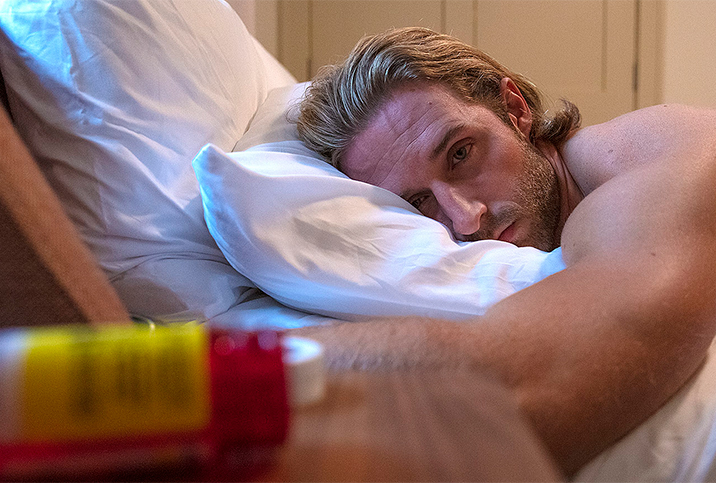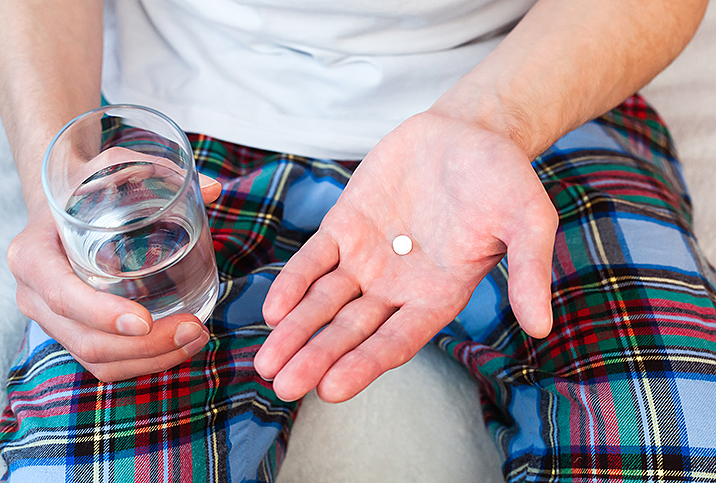Living With Mental Health Conditions and ED

Living with erectile dysfunction (ED) often goes hand in hand with living with mental health struggles. A 2009 study in Europe found that ED was associated with poorer mental health. The two conditions can feed off each other and take a toll on your mental and emotional state.
A landmark piece of research from the late 1980s, the Massachusetts Male Aging Study, found that ED is much more common than originally thought, suggesting that 52 percent of men had experienced some level of ED. It is often underreported, however, because a stigma still surrounds talking about the condition. The study estimated that by 2025, more than 300 million men in the world will suffer from erectile dysfunction. A 2016 self-reported survey of men in the United States suggested that as many as 47.5 million of them had experienced at least one episode of ED.
That is a high number of men potentially suffering from ED. And given the correlation found in the 2009 European study, lots of men also have associated mental health concerns.
Knowing that erectile dysfunction and mental health issues exist on their own and in tandem, what can you do to make the best of living with one or both? Let's take a look at the connection between them and how to ease the symptoms of both.
An overview of mental health and ED
Erectile dysfunction is a condition that is characterized by the inability to get or maintain an erection sufficient for intercourse. The penis becomes erect due to an increase in blood flow, typically when a man is aroused. Health conditions that reduce or constrict blood flow or lower hormone levels can impact whether a penis gets or remains erect. Yet blood flow and medical conditions are only telling part of the story.
While magazine ads and television commercials touting ED drugs have broadened the discussion surrounding the condition, it is still considered by many men to be a taboo subject. There are feelings of shame, embarrassment and anxiety surrounding the topic, which makes talking about and treating the condition difficult. Living with ED can take a mental toll on an individual, lowering self-esteem, ruining relationships and hindering personal development. Overcoming these mental health challenges takes work, both on your own and with your partner or potential partner.
To tackle the subject of mental health and erectile dysfunction, consider for a moment which came first. Is the source of your erectile dysfunction mental or physical? Did it start physically and then become mental? Every insight along those lines will help you figure it out.
A diagnosis of ED can be a complicated one, because both mental and physical health factors can play a role in the condition, and pinpointing which came first and which is impacting your current state can be difficult. Exploring both can help men gain greater clarity into their condition.
Consider that the following list is only a partial roundup of the physical causes of ED, and you'll begin to see the difficulty in diagnosing its roots:
- Cardiovascular disease
- Problems with blood flow
- Obesity
- Diabetes
- High cholesterol
- High blood pressure
- Metabolic conditions
- Parkinson's disease
- Multiple sclerosis
- Sleep disorders
- Low testosterone
- Drug and alcohol use
- Tobacco use
- Penis injuries
- Scar tissue in and around the penis
- Prescription medications
- COVID-19
Then add these potential psychological causes, and the puzzle gets more complicated:
- Stress
- Performance anxiety
- Depression
- Feelings of guilt
- Relationship issues
- Low self-esteem or self-worth
- Pornography addiction
While these lists may appear to be completely separate and unrelated, a closer look reveals that they have much common. A man who suffers from cardiovascular disease not only has a physiological reason for ED, but he may also be worked up about the possibility of having a stroke or a heart attack. This anxiety can become chronic or turn into depression. Not only is the cardiovascular disease impacting his ability to perform, but now his mental state has deteriorated to the point where it is also hindering his ability to get an erection.
A man gets the same result when he has depression or low self-esteem. His mental health is in such a state that maintaining an erection is difficult. When he is unable to sustain one, his already low view of himself becomes even worse. How men react is an individual trait, but some turn to drug or alcohol use to dull the pain of their self-loathing and erectile dysfunction, further hindering their ability to get an erection. In both scenarios, mental health condition plays a key role in perpetuating the cycle of ED and keeping men trapped in a vicious circle of doubt, vulnerability and stress.
The daily effects and impact of ED
Even if you aren't having sex every day, the impact of living with ED is always there. Thoughts about the condition can linger in the back of a man's mind and emerge at the most inopportune time. These thoughts can derail a good day at work, a date with a partner or a hangout session with friends. For many men, there is no separating ED from the rest of their life because it impacts so many aspects of it.
Too often the daily impact of living and coping with erectile dysfunction is immense because of the perceived social stigma that is still attached to the condition. Sexuality can have a profound impact on a person's identity and relationships. ED is still seen by many men as something of a weakness, something that makes them "less of a man." If they don't talk about it or address it, they can pretend it doesn't exist—except that isn't the way it really works. ED doesn't disappear because you don't want to talk about it. You know it's there, and chances are your partner knows it's there as well.
Keeping these thoughts and feelings bottled up feeds into the daily effects of living with ED: the stress, depression, shame and guilt. These feelings hurt, and they impact the way you carry and feel about yourself in a negative way and, again, help perpetuate the trouble with getting or keeping an erection because of your constant poor mental state.
Sex and relationships with ED
An ED diagnosis does not mean you have to give up on a fulfilling sex life. It may mean adjusting your sexual and personal relationships, but this isn't a bad consequence. In fact, it can help bring partners closer together and expand their sexual horizons.
You have heard it before but it bears repeating: Good relationships require communication. It is almost impossible to have a strong partnership and a healthy sexual relationship with someone if you are not willing to open up and talk about your ED. Yes, it may feel awkward at first, and you may have to work through your feelings of embarrassment, but it is a conversation worth having. Someone you care about and want to spend time with should not be intimidated or turned off by the fact you have a medical condition. Plus, consider this: Yes, dealing with ED is difficult for you, but your partner deserves to know about it because this can impact them, as well.
Initiating a conversation about ED can be difficult, but it's not impossible. Start slowly. Initiate the conversation with an open and honest discussion about the condition and how it impacts you personally. Try not to be confrontational or go on the defensive—that can stall open and productive conversations. Allow your partner to ask questions. They are not trying to attack you but rather gain a better foothold on the information you are presenting.
Once the details are out there and you both have adjusted to the information, it's time for the fun part. Talk about ways you can help each other make having sex and being close work for you both. Give your partner suggestions about ways they can help you. Talk about your likes and dislikes. Reassure them that it's not their fault when you can't get an erection—you are in no way rejecting them—and then suggest other activities that could be entertaining.
ED doesn't have to spoil the mood. Think about enjoying an erotic massage, lightly touching or exploring each other's body, cuddling, kissing, fondling or other forms of intimacy.
Think about the other implications of solid and open communication with your partner. Once you've discussed your ED, it's almost like a weight has been lifted. The stress of "What if they find out?" or "What if they think I'm not into them?" is removed from the equation, and that is a big mental block out of the way. That's not to say that sex and relationships will suddenly be easier, but it does remove a huge obstacle and allows both you and your partner to explore the direction of your partnership.
How to manage ED
Managing erectile dysfunction begins with talking to your doctor. So many factors can influence the development of ED that a physician needs to be involved in pinpointing those aspects and properly addressing them. If your ED is a symptom of a larger problem, such as cardiovascular disease or diabetes, treating the overarching condition can help ease the symptoms of ED. Once a physician has narrowed down the underlying cause of your erectile dysfunction, the treatment process can begin in earnest.
Managing ED typically begins with noninvasive treatments. Which treatment is right for you will, again, depend on your general health and the potential cause of the ED. If obesity, diabetes or cardiovascular conditions are issues, some medications may not be the right fit for treating your ED. Working with your doctor is the best way to find the treatment plan or plans that work best for your unique situation. Some medical ED treatments that you may want to discuss include:
- Oral drugs such as sildenafil (Viagra) or tadalafil (Cialis)
- Testosterone therapy
- Mental health therapy
- Wearable erection devices (for example, vacuum pumps or constriction devices such as Eddie by Giddy®)
- Penile injection therapies
- Penile implants
Talking to your doctor about holistic treatment is also an option. The Mayo Clinic lists a few herbal and natural supplements, including ginseng, dehydroepiandrosterone (DHEA), L-arginine and ginkgo, that may help improve symptoms of erectile dysfunction. It's also important not to discredit a healthy diet and exercise when it comes to improving sexual health.
While natural supplements may help, talk to your doctor first. Supplements can negatively impact people with certain health conditions or interact negatively with medications. They are also not regulated by the Food and Drug Administration, and some may be fake and even potentially dangerous.
Resources for help
Ready to reach out for help in dealing with ED and the mental strain it causes? There are places that can help. If you have a primary care physician you trust, talk to them about your situation and see if they can offer a referral or advice on who you should talk to about your issue. You can also find help by utilizing some of these mental health and erectile dysfunction services:
- Health Resources & Services Administration (provides information on finding healthcare services and centers near you)
- Substance Abuse and Mental Health Services Administration (SAMHSA) (provides general information on mental health and mental health services in your area)
- Anxiety & Depression Association of America
- Mental Health America
- American Urological Association


















